Coronavirus world: EU approves first Covid jab for kids aged 5-11
European nations have joined a small handful of countries by approving Covid vaccinations for children as young as five-years-old.
Coronavirus
Don't miss out on the headlines from Coronavirus. Followed categories will be added to My News.
The European Union has cleared Pfizer’s Covid-19 vaccine for use in children aged five to 11 making it the first jab to be approved in a cohort where the virus is rapidly spreading.
Only a small handful of countries had previously given the nod for coronavirus vaccinations in younger children, including the US, Israel and Canada.
“I’m glad to tell you that Comirnaty from today has received approval for children five to 11 years of age,” said Marco Cavaleri, head of vaccine strategy at the European Medicines Agency (EMA), using the vaccine’s brand name.
“This is based on a different dose in the one used in adults, essentially it’s a much lower dose,” he told an online public meeting.
The vaccine was already cleared for use in people aged 12 and over in the 27-nation EU.
Children aged five to 11 will be given one third of the dose that older people receive, with two injections, three weeks apart, the EMA said in a statement.
The vaccine was 90.7 percent effective in a study of nearly 2,000 children of that age, it added.
Side effects were usually “mild or moderate” lasting a few days, and included pain in the injection site, tiredness, headache, muscle pain and chills.
The EMA “therefore concluded that the benefits of Comirnaty in children aged five to 11 outweigh the risks, particularly in those with conditions that increase the risk of severe Covid-19.”
But the Pfizer jab’s safety in children “will continue to be monitored closely”.
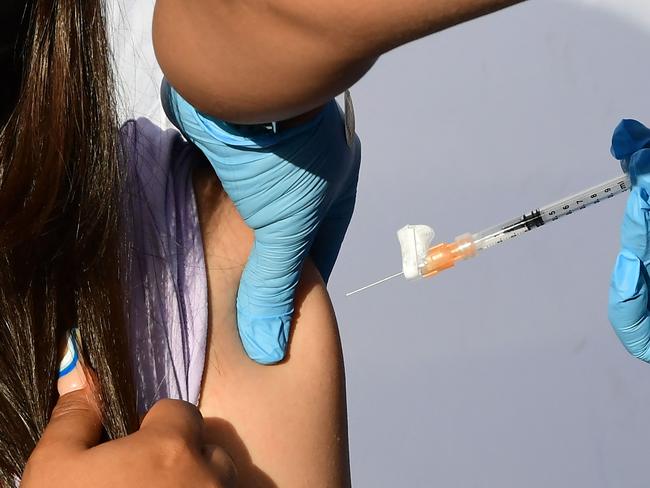
WORRYING NEW COVID VARIANT
A new Covid variant that carries dozens of mutations and may drive further waves of the disease by evading vaccines has been found in three countries.
While only 10 cases have been confirmed, the variant has sparked serious concern among some researchers because the strain has 32 mutations.
Virologists believe it is an offshoot of an older variant called B.1.1, which was first spotted in Botswana where three cases have now been sequenced.
Six more have been confirmed in South Africa, and one in Hong Kong in a traveller returning from South Africa.
The B.1.1.529 variant has 32 mutations in the spike protein, the part of the virus that most vaccines use to prime the immune system against Covid.
Dr Tom Peacock, a virologist at Imperial College, posted details of the new variant, noting it was the first time he had seen two particular mutations in one variant.
“Export to Asia implies this might be more widespread than sequences alone would imply,” he tweeted.

“Also the extremely long branch length and incredibly high amount of spike mutations suggest this could be of real concern (predicted escape from most known monoclonal antibodies).
“Worth emphasising this is at super low numbers right now in a region of Africa that is fairly well sampled, however it very, very much should be monitored due to that horrific spike profile (would take a guess that this would be worse antigenically than nearly anything else about).”
Experts say new variants are found fairly often, and mostly don’t spread over a cluster of cases. They can also quickly die out if they present in a country with a more dominant variant.
Covid-19 Incident Director at the UK Health Security Agency, Dr Meera Chand, told the Sun: In partnership with scientific bodies across the globe, is constantly monitoring the status of SARS-CoV-2 variants as they emerge and develop worldwide.
“As it is in the nature of viruses to mutate often and at random, it is not unusual for small numbers of cases to arise featuring new sets of mutations.
“Any variants showing evidence of spread are rapidly assessed.”
BODIES ‘PILE UP’ IN MORGUES
Europe remains “in the firm grip” of Covid and the death toll on the continent could top 2.2 million this winter if current trends continue, the World Health Organisation said this morning.
Some 700,000 could die in the coming months, the WHO said, as cases creep up across Europe, prompting some countries to reimpose tough restrictions.
The WHO expects “high or extreme stress in intensive care units (ICUs) in 49 out of 53 countries between now and March 1, 2022”.
“Cumulative reported deaths are projected to reach over 2.2 million by spring next year,” it added, up from the current 1.5 million.
Covid-19 is the leading cause of death across Europe and Central Asia, the WHO reported, citing figures from the Institute for Health Metrics and Evaluation.
The rise in Europe was being driven by a combination of the highly-contagious Delta variant, insufficient vaccination coverage and the easing of measures such as mask wearing and physical distancing, it said.
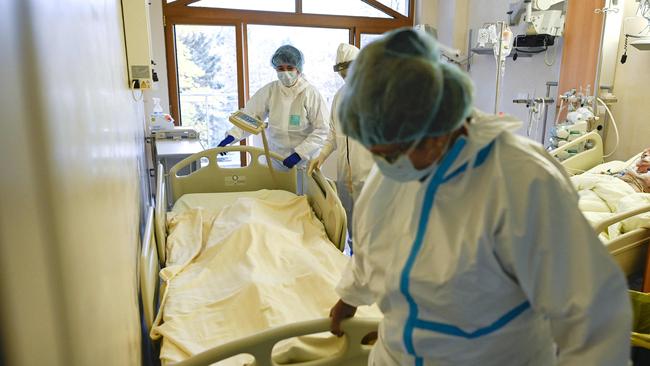
According to WHO data, Covid-related deaths increased last week to nearly 4200 a day, doubling from 2100 deaths a day at the end of September.
The WHO also said evidence was growing that vaccine-induced protection against infection and mild disease was declining.
Dr Hans Kluge, the WHO’s regional director for Europe, said it was essential that countries adopted a “vaccine plus” approach.
“This means getting the standard doses of vaccine and taking a booster if offered,” he said. “but also incorporating preventive measures into our normal routines.”
In combination with the vaccines, Dr Kluge said, wearing a mask, washing your hands, ventilating indoor spaces, keeping physical distance, and sneezing into your elbow were “simple, effective ways of gaining control over the virus”.
The WHO said face masks reduce Covid incidence by 53 per cent according to a recent study.
“All of us have the opportunity and responsibility to help avert unnecessary tragedy and loss of life and limit further disruption to society and businesses over this winter season,” by avoiding “the last resort of lockdowns and school closures”.
“The Covid-19 situation across Europe and Central Asia is very serious. We face a challenging winter ahead,” he said.
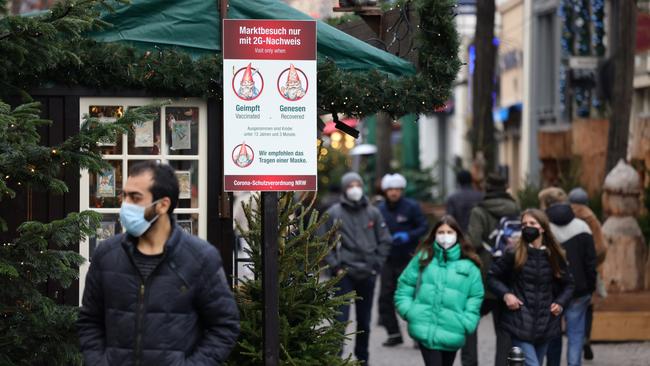
The WHO said more than 1 billion vaccine doses had been administered in the WHO European region and 53.5 per cent of people had completed their inoculation program, but added that the figure “hides wide differences between countries”, with some populations less than 10 per cent vaccinated and others more than 80 per cent.
The situation facing the eastern European country is now so dire that CNN reports bodies have started to “pile up”, with morgues and hospitals overflowing with patients and casualties.
And the crisis has been made worse by Romania’s shockingly low vaccination rate as scepticism and misinformation abounds.
Romania has a population of around 19 million, but according to Reuters, just 37 per cent are fully vaccinated, despite jabs being available for almost one year now.
That grim number means Romania has one of the lowest vaccination rates in Europe, thanks to especially high levels of vaccine hesitancy, misinformation and superstition, as well as strong religious beliefs and distrust of the government.
Many high-profile Romanians, including religious leaders, have publicly condemned the vaccination campaign – with several labelling it the work of the “Devil” – and anti-vax lies and distortions have also run rampant on social media.
COVID PILL COULD BE APPROVED ‘WITHIN WEEKS’
The European Medicines Agency’s decision on whether to approve Merck’s anti-Covid pill Lagevrio, which offers patients an easy at-home treatment for the virus, could be made “within weeks”.
“EMA will assess the benefits and risks of Lagevrio under a reduced timeline and could issue an opinion within weeks if the data submitted are sufficiently robust and complete,” the European Medicines Agency said in a statement on Tuesday.
On Friday, the EMA issued advice allowing individual EU countries to decide for themselves on using Lagevrio — also known as molnupiravir — in emergency situations, “in light of rising rates of infection and deaths” from Covid.
It’s also weighing a authorisation for a similar pill from Pfizer.
The two drugs from the US pharma giants represent a potentially groundbreaking step in the fight against coronavirus, as studies show they drastically reduce the risk of hospitalisation and death in high-risk patients.

COUNTRY WHERE DELTA ‘MUTATED TO EXTINCTION’
Experts in Japan have been left convinced that the nation of 125 million has successfully eradicated the Delta variant of Covid-19, after incredible new data emerged.
According to new research from Japan’s National Institute of Genetics, scientists say that the deadly strain drove itself towards a “natural extinction” after several mutations led to it being unable to make copies of itself.
Since the beginning of the pandemic, the Japanese population have been on high alert especially after the highly-transmissible Delta variant broke through its borders in 2021.
At the peak of their fifth wave, the country recorded a staggering 26,000 cases per day as countries around the world, including Australia, imposed strong lockdown measures to squash the Delta curve.
However, in November, the nation saw a glimpse of recovery.
Over the past few weeks, Japan has been recording under 200 cases and on Friday registered its first day without a Covid death in 15 months.
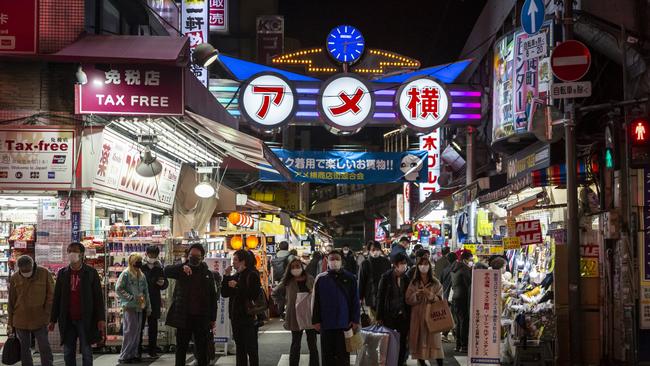
In what has been described as a “potentially revolutionary” theory, genetics expert Professor Ituro Inoue said the Delta variant simply accumulated too many mutations to the virus’s error-correcting protein called nsp14.
Prof Inoue says the virus struggled to repair the errors in time and ultimately caused its own “self-destruction”.
“We were literally shocked to see the findings,” Inoue told The Japan Times.
“The Delta variant in Japan was highly transmissible and keeping other variants out. But as the mutations piled up, we believe it eventually became a faulty virus and it was unable to make copies of itself.
“Considering that the cases haven’t been increasing, we think that at some point during such mutations it headed straight toward its natural extinction.”
Some experts believe that it’s vaccines, with more than 75 per cent of Japanese double-jabbed, and face masks that have managed to suppress the virus.
But Prof Inoue believes new infections would still be on the up if the Delta strain were still “alive and well”.
“If the virus were alive and well, cases for sure would increase, as masking and vaccination do not prevent breakthrough infections in some cases,” he said.
In early October, Japan reopened after a period of heavy restrictions and now boasts one of the lowest infection rates of any developed nation.
However, Prof Inoue warns there is still “a threat” and that the country is not immune to potential new strains.
He added that it’s still too optimistic to believe the Covid-19-causing SARS-CoV-2 virus will experience a similar decline globally.
“No genome data exists, so it’s just a hypothesis, but because it has disappeared, it will never see the light of day again,” he said.
“The chances are not zero, but that seems too optimistic for now as we’re unable to get hold of any such evidence, though we have looked at various data of other countries,” he said.
EUROPE’S NEW COVID CRISIS
Austria has returned to a partial lockdown in the most dramatic Covid-19 restrictions seen in Western Europe for months after a weekend of violence against virus measures rocked several cities on the continent.
The Alpine nation is also imposing a sweeping vaccine mandate from February 1, one of few places in the world to announce such a step so far.
Shops, restaurants and festive markets were shuttered on Monday local time, while its 8.9 million people are not allowed to leave home with few exceptions such as going to work, shopping for essentials and exercising as virus cases are surging.
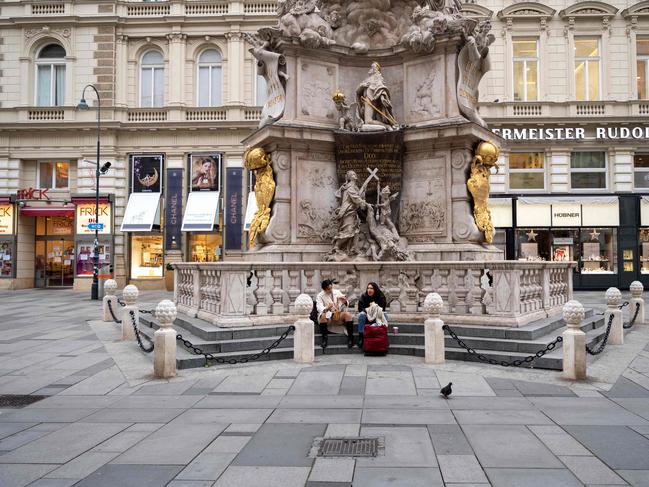
Schools and kindergartens remain open, though parents have been asked to keep children at home when possible despite there being no distance learning offered during the three-week lockdown.
One parent, Kathrin Pauser, said she was still dropping her daughters nine and 11, both of who got recently vaccinated, to school.
“It’s a very confusing situation,” she told reporters.
The measures come after a weekend of violent clashes in several European cities — including in Belgium and the Netherlands — where tens of thousands demonstrators took to the streets to protest Covid measures.
Around 145 people have been arrested in the Netherlands over three days of unrest sparked by a Covid curfew, and in Brussels on Sunday, officers fired water cannon and tear gas at a protest police said was attended by 35,000.
Dutch Prime Minister Mark Rutte on Monday slammed the “violence under the guise of protest”, saying he defends the right to demonstrate peacefully, but “will never accept that idiots use pure violence”.
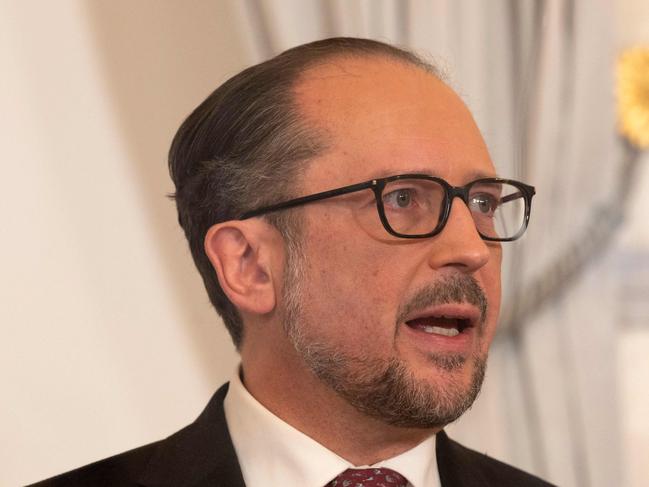
And in Denmark this weekend, around 1,000 demonstrators protested government plans to reinstate a Covid pass for civil servants.
“People want to live,” said one of the organisers of the Dutch protests, Joost Eras. “That’s why we’re here.”
A crowd of 40,000 marched through Vienna on Saturday decrying “dictatorship”, while some 6,000 people protested in the city of Linz on Sunday.
Vienna’s rally was organised by a far-right political party, and some protesters wore a yellow star reading “not vaccinated”, mimicking the Star of David Nazis forced Jews to wear during the Holocaust.
French troops headed to Guadeloupe on Sunday after a week of unrest over Covid measures, while Prime Minister Jean Castex was set to convene a meeting in Paris with officials from the French Caribbean island.
Roads were blocked Sunday after protesters defying a curfew looted and torched shops and pharmacies overnight, when police made 38 arrests and two members of the security forces were injured.
‘VACCINATED, CURED OR DEAD’
The violence come as Covid infections spiral in Europe.
Germany’s Health Minister Jens Spahn issued a fresh call on Monday local time for citizens to get vaccinated.
“Probably by the end of this winter, as is sometimes cynically said, pretty much everyone in Germany will be vaccinated, cured or dead,” Mr Spahn said, blaming “the very contagious Delta variant”.
Austria’s decision flies in the face of earlier promises that tough virus restrictions would be a thing of the past.
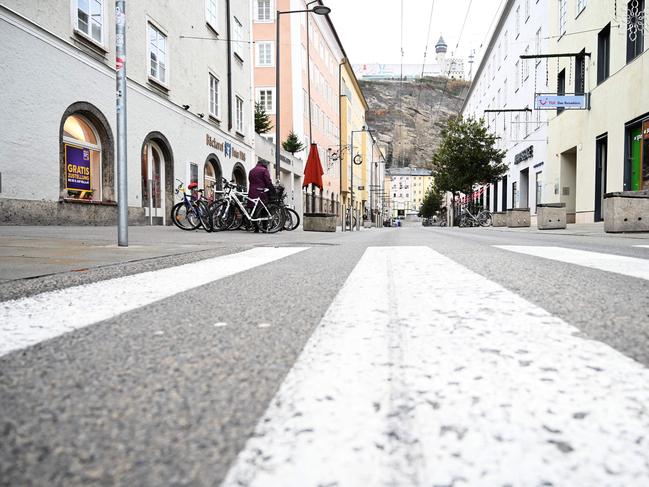
Over the summer, then chancellor Sebastian Kurz had declared the pandemic “over”.
But plateauing inoculation rates, record case numbers and a rising death toll have forced the government to walk back such bold claims.
After taking office in October, Chancellor Alexander Schallenberg criticised the “shamefully low” vaccine rate — 66 per cent compared to France’s 75 per cent — and banned the un-jabbed from public spaces.
When that proved ineffective at squelching new infections, he announced a nationwide lockdown, with an evaluation after 10 days.
Political analyst Thomas Hofer blamed Mr Schallenberg for maintaining “the fiction” of a successfully contained pandemic for too long.
“The government didn’t take the warnings of a next wave seriously,” he told reporters. “The chaos is evident.”
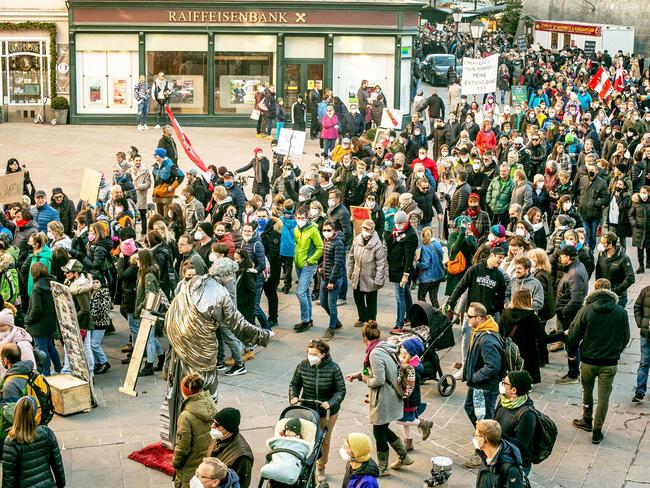
SHOCK NEW GRAPH REVEALS NEXT COVID WAVE
Fifth-wave coronavirus infections in France are rising at an alarming rate, the government reported on Sunday, with new daily Covid cases close to doubling over the past week.
The seven-day average of new cases in France reached 17,153 on Saturday, up from 9,458 a week earlier, according to the health authorities, an increase of 81 per cent.
“The fifth wave is starting at lightning speed,” government spokesman Gabrial Attal told media.
The latest seven-day increase is three times the average rise of cases recorded over the previous three weeks, indicating an exponential acceleration of infections.
For now the spike in infections has not led to a massive influx of Covid patients into hospitals, with the authorities attributing the limited number of intensive care patients to France’s high rate of vaccinations which appear highly effective against the most dangerous forms of Covid.
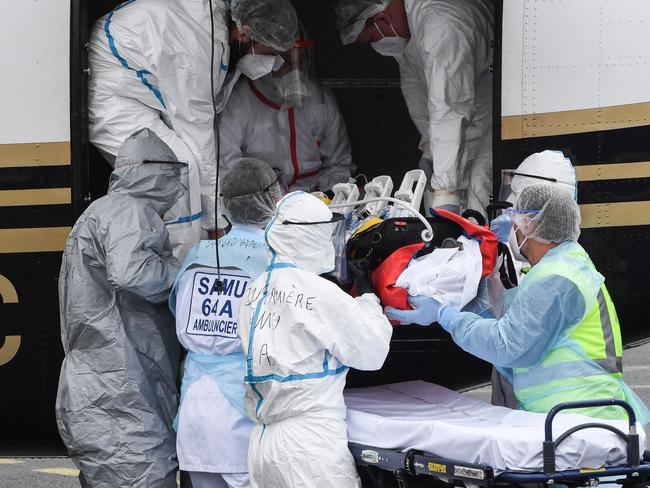
On Saturday, hospitals reported a total of 7,974 Covid patients in their care, with 1,333 of them in intensive treatment.
This compares to 6,500 and 1,000, respectively, a month earlier.
“There is a very strong increase in infections, but we also know that in France we have a very large vaccination cover,” he said.
“We seem to be ahead of our neighbours concerning booster shots.” France’s introduction of a health pass ahead of other countries in the summer was also helping to keep Covid in check, he said.
The health pass, required in French restaurants, cafes and many cultural venues, certifies that a person is fully vaccinated, has recently recovered from Covid, or has tested negative for the virus.
The government continues to stand by its choice to “bring the weight of restrictions to bear on non-vaccinated people rather than vaccinated people”, Attal said.
Europe is battling another wave of infections and several countries have tightened curbs despite high levels of vaccination, especially in the west of the continent.
Belgium, one of the countries hit the hardest by the latest wave, on Wednesday expanded its work-from-home rules and strengthened curbs targeting the unvaccinated.
With an average of nearly 10,300 new infections per day over the past week, Belgium is back to a rate of spread of the virus that has not been seen for a year.
Belgium also recorded 42 Covid deaths on Friday
CHAOS AS PROTESTS ERUPT GLOBALLY
Violence broke out at a protest against anti-Covid measures in Brussels, with protesters throwing projectiles as police fired water cannon and tear gas.
At least two police were injured in the events, as officers in riot gear charged the crowd backed by water cannon. One protester was seen being evacuated by an ambulance near the Berlaymont, the EU headquarters.
Police told Belga news agency that three police officers were injured in the rioting, without giving further details.
Several of the demonstrators caught up in the clash wore hoods and carried Flemish nationalist flags, while others wore Nazi-era yellow stars.
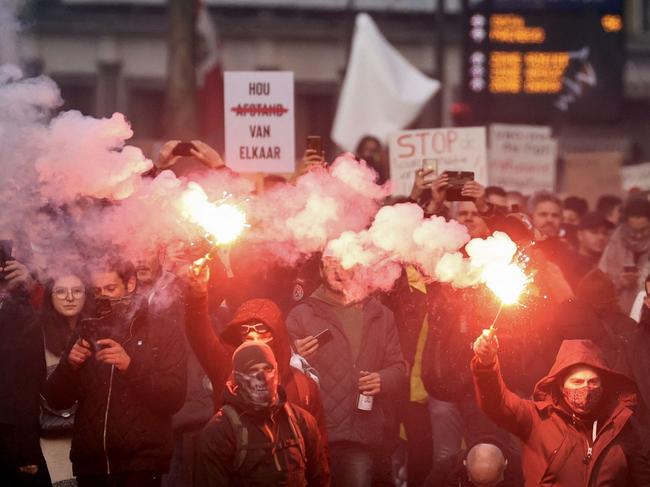
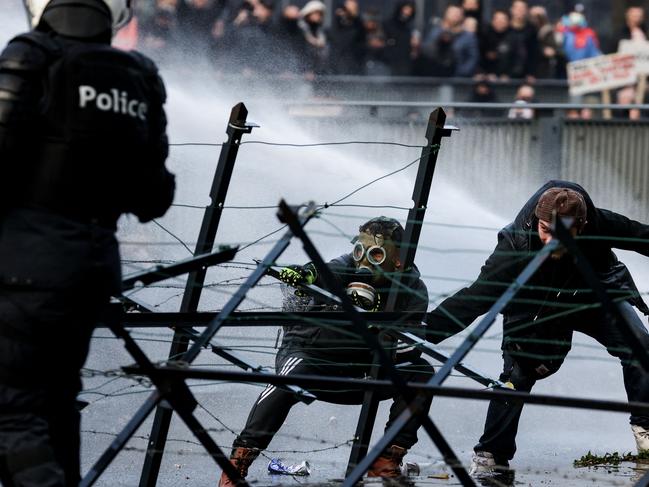
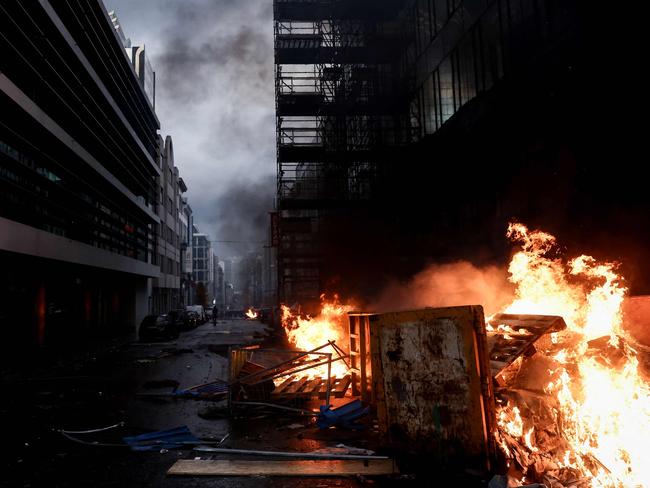
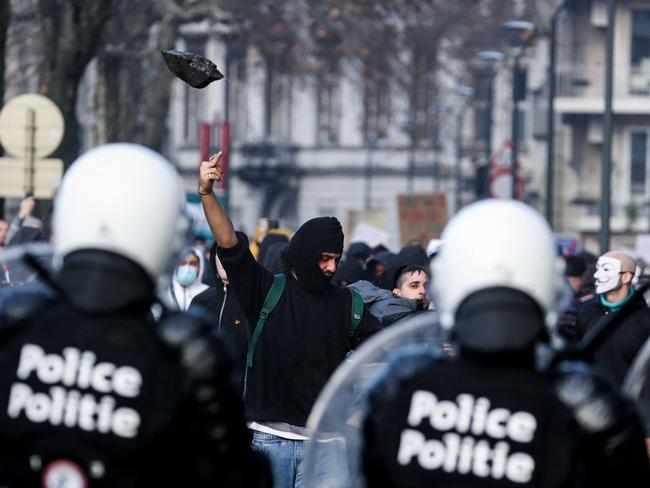
Protesters set fire to wood pallets, and social media images showed rioters attacking police vans with vandalised street signs.
The stand-off with riot police took place throughout the Belgian capital’s EU and government district, just metres (yards) from the US and Russian embassies.
Police said 42 people were briefly detained, while two were arrested.
Police said 35,000 protesters marched from the North Station in Brussels against a fresh round of Covid measures announced by the government on Wednesday.
The demonstration, called “Together for Freedom”, largely focused on a ban on the unvaccinated from venues such as restaurants and bars.
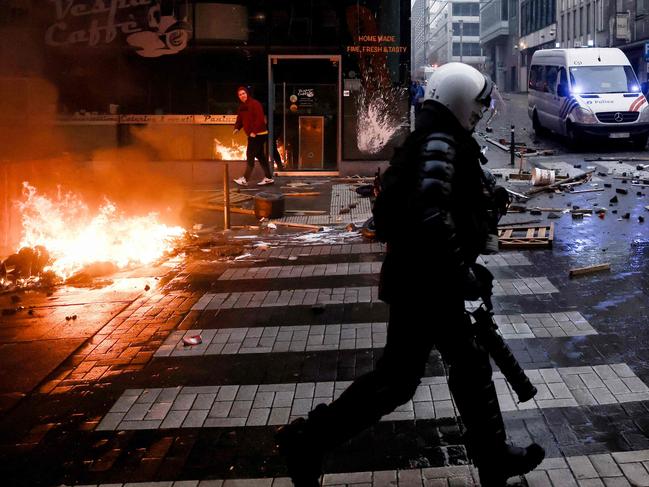
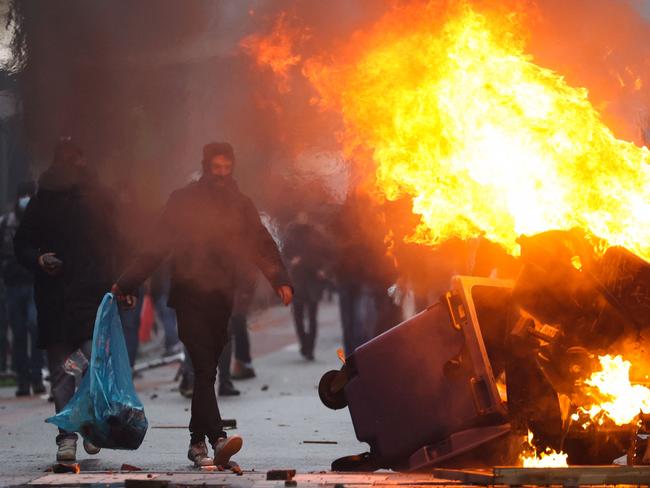
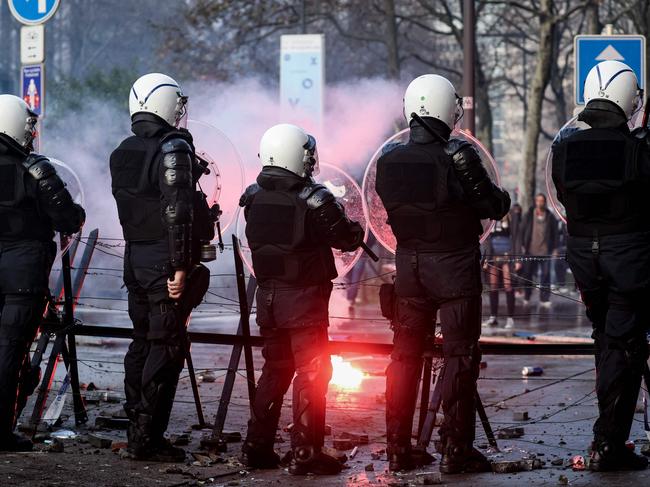
It comes as there was more looting and violence overnight in the French Caribbean island of Guadeloupe leading to 37 new arrests, police said, after protests against the coronavirus vaccine pass spiralled into violence over the last week.
Dozens of elite police and counter-terrorism officers are expected to arrive from mainland France on Sunday to bolster local forces.
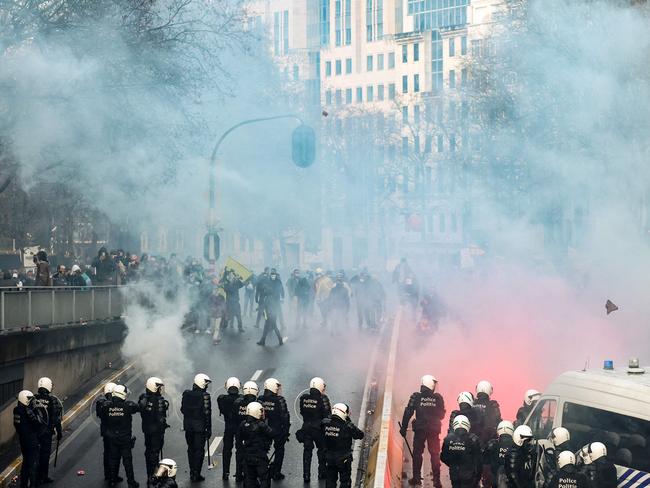
‘ALL HELL BROKE LOOSE’
Organisers cancelled a Dutch protest on Saturday but a few hundred people still gathered in Amsterdam and a similar number marched through the southern city of Breda.
The group that cancelled the Amsterdam rally said on Facebook it acted because “last night, all hell broke loose in Rotterdam”.
“The riots and extreme violence against police, riot police and firefighters last night in Rotterdam are horrifying,” said Dutch security Minister Ferd Grapperhaus.
The World Health Organisation continues to favour policies that “demonstrate the benefit and safety of vaccines for the greatest possible acceptance of vaccines, rather than imposed mandatory vaccination,” spokeswoman Fadela Chaib told reporters in Geneva.
But Schallenberg said: “Despite months of persuasion, we have not succeeded in convincing enough people to get vaccinated,” and that vaccination is the only “exit ticket” out of the pandemic.
Dutch coronavirus demonstrators held fresh rallies on Saturday, a day after 51 people were arrested in an “orgy of violence” in Rotterdam that left two people in hospital with bullet wounds.
The Netherlands went back into Western Europe’s first partial lockdown of the winter last Saturday with at least three weeks of curbs, and is now planning to ban unvaccinated people from entering some venues.
A few hundred protesters angered at the latest measures gathered in Amsterdam on Saturday and a similar number marched through the southern city of Breda.
It followed the Rotterdam unrest where police said they had fired both warning and targeted shots and used water cannon.
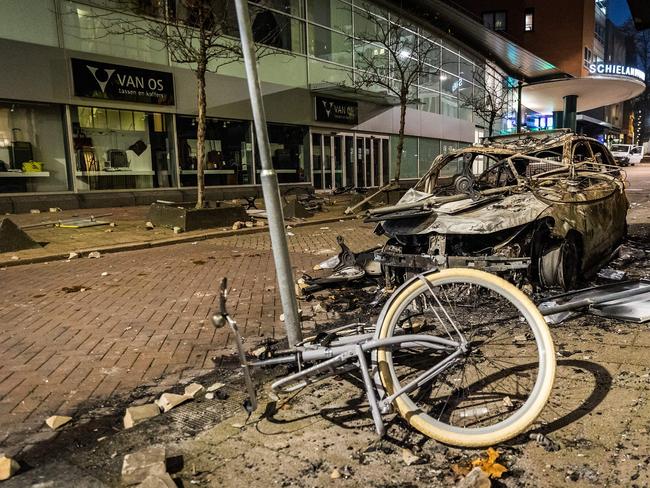
“Fifty-one people were arrested during the major disturbances on Friday evening and night on Coolsingel (street) in Rotterdam. About half of them were just underage,” Rotterdam police said in a tweet.
The rioters came from different parts of the country, they said. Police were still searching for more suspects.
“Two rioters were injured when they were hit by a bullet. They are still in the hospital,” the police said, adding that the Dutch national criminal investigation department would probe “whether the injuries were caused by police bullets”.
A policeman was also taken to hospital with leg injuries while several other officers were hurt or suffered hearing damage because of large fireworks set off by the rioters, police said.
Police had said earlier that they fired several warning shots but that “at one point the situation became so dangerous that officers felt compelled to shoot at targets”.
They dismissed rumours on social media that someone had died during the violence in Rotterdam.
The city’s mayor Ahmed Aboutaleb denounced an “orgy of violence”, adding: “The police have felt the need to draw a police weapon in the end to defend themselves.”
DEMONSTRATIONS FROM AUSTRIA TO AUSTRALIA
It comes as thousands took to the streets in Austria and Australia over the weekend as anger mounted over new Covid restrictions imposed to tackle a resurgent pandemic.
Austria on Friday announced a national partial lockdown — the most dramatic restrictions in Western Europe for months.
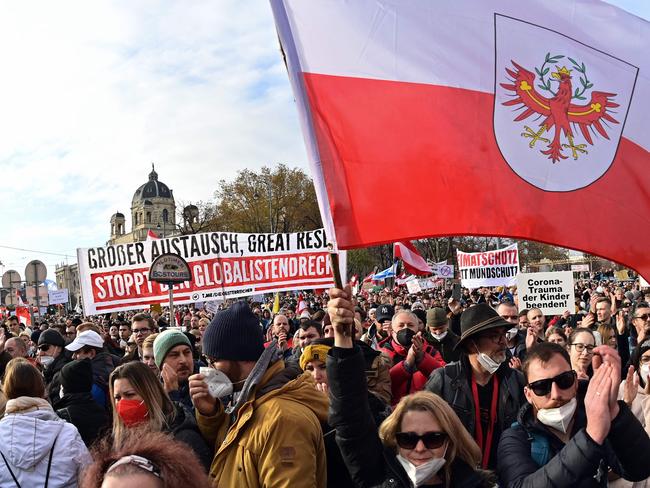
Other nations on the continent have resorted to choosing to ban unvaccinated people from venues like restaurants and bars.
Some 10,000 people marched in Sydney and there were protests in other major Australian cities against vaccine mandates, which are not universal and have only been applied to certain occupations by state authorities.
“In Australia where a fanatical cult runs our health bureaucracies, they say it’s OK (to vaccinate children),” right-wing politician Craig Kelly told the Sydney crowd to large cheers.

Thousands gathered on Saturday in central Vienna near the Chancellery, responding to a call by the far right FPO party, to denounce the new measures.
They held up banners decrying “Corona dictatorship” and slamming the “division of society”.
“It’s not normal that the government deprives us of our rights,” said 42-year-old Katarina Gierscher, who travelled for six hours to get to the rally.
“The government wants to divide us. We must remain united.” From Monday, 8.9 million Austrians will not be allowed to leave home except to go to work, shop for essentials and exercise. The restrictions will initially last 20 days with an evaluation after 10 days.
Vaccination against Covid-19 in the Alpine nation will be mandatory from 1 February next year.
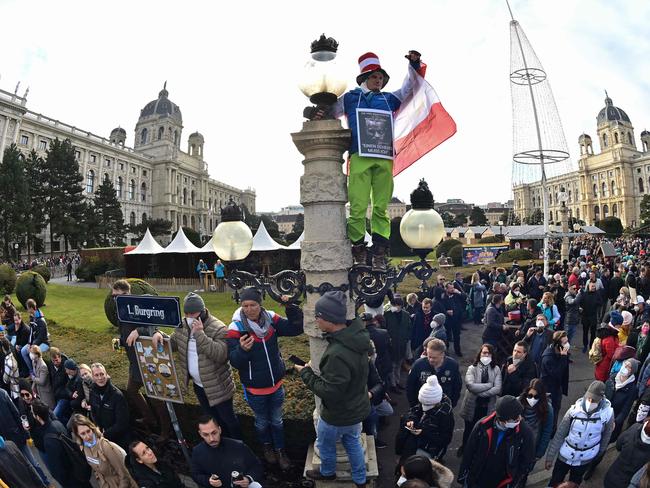
Austria has already imposed movement restrictions on those not vaccinated or recently recovered from the virus, ordering them to stay at home since Monday, becoming the first EU country to do so.
But infections have continued to rise. On Friday, a new record of more than 15,800 new cases was recorded in the EU member of nearly nine million people.
“I was hoping that there wouldn’t be a general lockdown,” said Markus Horvath as he prepared to shut from Monday his stall selling wooden jewellery at a Christmas market in Vienna.
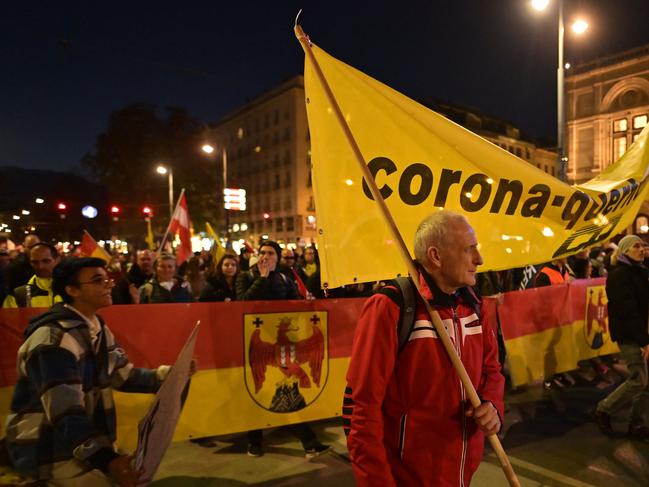
Christian Edlmayr, selling glass ornaments at another Vienna Christmas market, said he would lose half his yearly revenue.
“This will be very, very bad for me,” he said.
Under the partial lockdown, only outlets deemed essential will remain open such as supermarkets, banks, pharmacies and post offices.
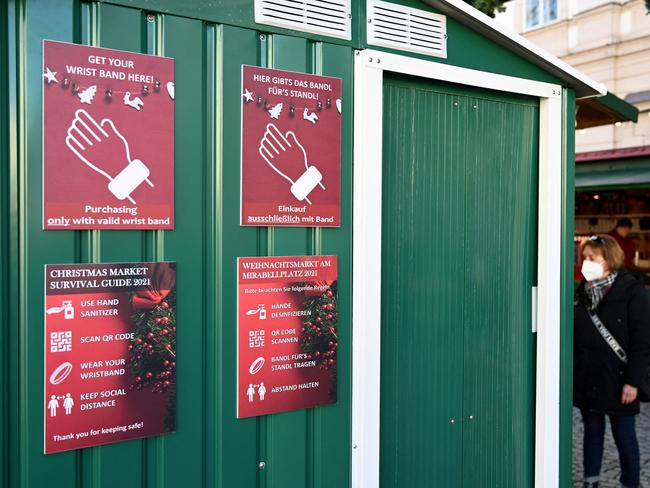
Andreas Schneider, a 31-year-old from Belgium who works as an economist in the Austrian capital, also described the lockdown as a “tragedy”, saying confining just the unvaccinated had been “reasonable” since they had a choice.
Other European countries are also reintroducing curbs to fight the virus’s spread.
On Friday, the German state of Bavaria cancelled all of its popular Christmas markets this year, and announced a shutdown of clubs, bars and night service at restaurants.
“The situation is very, very serious and difficult,” state premier Markus Soeder told a news conference.
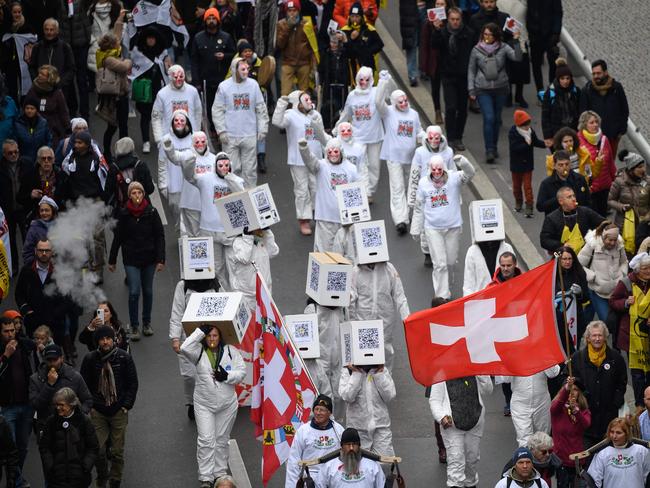
Switzerland’s health minister insisted new Covid-19 restrictions were not necessary despite daily new cases quadrupling in a month to an all-year high.
“We are clearly facing the fifth wave,” Alain Berset told a news conference, adding that the course of the pandemic “will depend on the behaviour of all of us”.
Though the virus is spreading particularly among younger people less likely to suffer severe illness from the disease, Mr Berset said the surge in cases was more worrying as “the number of adults who have no immunity is too big”.
Around 65 per cent of the Swiss population are now fully vaccinated, while a further two per cent have had the first dose of a two-jab course.
With case rates having shot up since mid-October, the Swiss authorities fear an overload of hospital cases as the winter kicks in.
Bern University epidemiologist Christian Althaus called for a return to working from home, free tests and greater mask-wearing indoors, given the surge in cases.
“We are not out of the danger zone yet. Given the current situation, we could find ourselves once again in a critical situation by Christmas,” he said.
More Coverage
Read related topics:Pfizer



